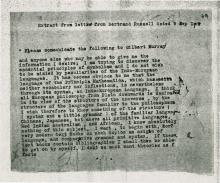BRACERS Record Detail for 52370
To access the original letter, email the Ready Division.
This document is headed: "Extract from letter from Bertrand Russell dated 9 Sep 1918". This is followed by: "Please communicate the following to Gilbert Murray and anyone else who may be able to give me the information I desire: I am trying to discover the essential principles of symbolism."
Rinder was added to the Recipients only because handwritten corrections are in her handwriting.
Letter 101
BR TO GILBERT MURRAY, 9 SEPT. 1918
BRACERS 52370. TL(TC). Bodleian
Previous Brixton letter, BRACERS 19360; next letter, BRACERS 18692
Edited by K. Blackwell, A. Bone, N. Griffin and S. Turcon
<Brixton Prison>1
9 Sep 1918
Please communicate the following to Gilbert Murray and anyone else who may be able to give me the information I desire: I am trying to discover the essential principles of symbolism and I do not wish to be misled by peculiaritiesa of the Indo-European languages. It has become obvious to me that the language of the Principia Mathematica, which has neither vocabulary nor inflections, is nevertheless through its syntax, an Indo-European language. I think all European philosophy from Plato downwards is dominated in its view of the structure of the universe,b by the structure of the languages familiar to the philosophers.2 I wish therefore to know something of the structure (syntax and a little grammar) of the familiar languagesc Chinese, Japanese, but above all primitive languages, Red Indian,d Australian, and African. I know absolutely nothing of this subject. I want, to begin with, 2 or 3 very modern text books on such topics as origin of language, and comparative grammar and syntax. If these text books contain bibliographies I shall then be able to get on by myself. I don’t so much want theories as facts.
- 1
[document] The letter was edited from a typed message with corrections in the hand of Gladys Rinder. The message is headed “Extract from letter from Bertrand Russell dated 9 Sep 1918”, which was likely addressed to her. The sheet is hand-numbered 69 from a bound sequence in the Murray papers in the Bodleian Library, Oxford.
- 2
I think all ... languages familiar to the philosophers. In 1903 BR had claimed that grammar was a better guide to logic than the current opinions of philosophers. The constituents of the proposition that a sentence expressed could be revealed by assigning the meaning to each word in the sentence, a process that was more accurate as the language to which the sentence belonged contained fewer inflexions (The Principles of Mathematics, p. 42). After discovering his theory of descriptions in 1905, BR came to think that the sentences of natural language required a good deal of prior analysis before the propositions expressed by them could be revealed, a view embodied in the formal language of Principia Mathematica. But despite the sophistication of the grammatical analysis, the atomic sentences for which PM provided the syntax are invariably composed of subject and predicate, or terms and relation, and this gibes very well with the view of the universe expressed in PM: “The universe consists of objects having various qualities and standing in various relations” (1: 43). Although BR was far from explicit about his present concerns, it seems very likely that his worry was that substance/accident ontologies like this were in fact being dictated by the subject/predicate grammar of the Indo-European languages and that this might be merely an accidental feature of those languages. BR never did undertake the study of comparative grammar that he proposed here: he was released from prison before the requisite books could be found for him. But next year BR told Colette: “I have read two books on Language, and am looking out for others” (4 March 1919, BRACERS 19443). The only one he mentioned in his brief discussion of language in The Analysis of Mind was Wilhelm Wundt’s Völkerpsychologie (1904), which was not in his prison reading (see Papers 8: App. III).
- a
peculiarities Misspelt as “peculiarites”.
- b
universe Misspelt as “unuverse”.
- c
familiar languages BR may have written, or intended, “unfamiliar” in the lost original of the letter, since he had just stated that Indo-European languages were familiar to philosophers and now he instanced non-Indo-European languages.
- d
Red Indian Comma added following.

